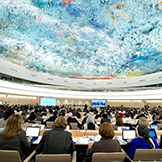Human Rights Council 37th session (26 February – 23 March)
Interactive dialogue with the Commission on South Sudan
Statement by Ireland
13 March 2018
Ireland fully aligns itself to the statement of the European Union, and wishes to add the following.
Madame Vice President,
We thank the Commission for its efforts in producing this report on the human rights situation in South Sudan.
The atrocities it details are harrowing, and as noted by the Commission, amount to war crimes and crimes against humanity. While the description and documentation of these crimes cannot truly represent the vast trauma of what victims have suffered, it can and will contribute to the pursuit of justice.
We condemn the repugnant actions of those who perpetrate and permit killings, abductions, torture, mutilations, rape and sexual violence. We do not forget, however, that their actions are realised within a political context which continues to perpetuate conflict and brazenly disregard calls for peace. The governments represented here in this room collectively have the capability to promote peace and work towards an end tothe cruelty that is being inflicted on the innocent people of South Sudan, and in this regard we urge full support for the IGAD-led efforts to revitalise the peace process.
We echo calls for the Government of South Sudan and all parties to the conflict to abide by the recent Cessation of Hostilities agreement and to end the cycle of protracted conflict and violence in the country. The Government of South Sudan must take immediate responsibility for the protection of its citizens, including through the establishment of the Hybrid Court to investigate and prosecute those responsible for committing atrocities, and by taking steps to establish the Commission on Truth, Reconciliation and Healing.
Justice and accountability structures can protect the basic dignity of human lives and are means to confront the deep horrors inflicted on the population of South Sudan. They hold the potential to give voice to those who have suffered, and are necessary for peacebuilding and ending the cycle of senseless violence in the country.
Considering the extreme levels of trauma experienced by the people of South Sudan, what can be done to integrate treatment and psychosocial support into the design of justice and conflict resolution mechanisms, and how can the international community better address this need?

